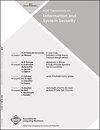企业系统的帕累托最优对抗性防御
Q Engineering
引用次数: 44
摘要
由美国国家标准与技术研究所维护的国家漏洞数据库(NVD)提供了有关流行软件中漏洞的有价值的信息,以及解决这些漏洞的任何可用补丁。如今,大多数企业安全管理人员只是简单地修补最危险的漏洞——因此,攻击者可以通过使用不太重要的漏洞渗透企业,轻松地危害企业。在本文中,我们将企业中的漏洞捕获为漏洞依赖图(Vulnerability Dependency Graph, VDG),并说明攻击图可以用它们来表示。我们首先要问的问题是:攻击者应该利用哪一组漏洞来最大化其预期影响?我们证明了这个问题可以作为一个整数线性规划来解决。防御者显然希望最小化攻击者发起的最坏情况攻击的影响,但防御者也有义务确保其企业内的高生产率。我们提出了一种算法,该算法为防御者找到一个帕累托最优解,使他能够同时最大化生产力并最小化企业网络上修补产品的成本。我们已经实现了这个框架,并表明即使对于包含30K边的大型vdg,我们的计算运行时间也都在可接受的时间范围内,并且生产力和攻击影响之间的平衡也是可以接受的。本文章由计算机程序翻译,如有差异,请以英文原文为准。
Pareto-Optimal Adversarial Defense of Enterprise Systems
The National Vulnerability Database (NVD) maintained by the US National Institute of Standards and Technology provides valuable information about vulnerabilities in popular software, as well as any patches available to address these vulnerabilities. Most enterprise security managers today simply patch the most dangerous vulnerabilities—an adversary can thus easily compromise an enterprise by using less important vulnerabilities to penetrate an enterprise. In this article, we capture the vulnerabilities in an enterprise as a Vulnerability Dependency Graph (VDG) and show that attacks graphs can be expressed in them. We first ask the question: What set of vulnerabilities should an attacker exploit in order to maximize his expected impact? We show that this problem can be solved as an integer linear program. The defender would obviously like to minimize the impact of the worst-case attack mounted by the attacker—but the defender also has an obligation to ensure a high productivity within his enterprise. We propose an algorithm that finds a Pareto-optimal solution for the defender that allows him to simultaneously maximize productivity and minimize the cost of patching products on the enterprise network. We have implemented this framework and show that runtimes of our computations are all within acceptable time bounds even for large VDGs containing 30K edges and that the balance between productivity and impact of attacks is also acceptable.
求助全文
通过发布文献求助,成功后即可免费获取论文全文。
去求助
来源期刊

ACM Transactions on Information and System Security
工程技术-计算机:信息系统
CiteScore
4.50
自引率
0.00%
发文量
0
审稿时长
3.3 months
期刊介绍:
ISSEC is a scholarly, scientific journal that publishes original research papers in all areas of information and system security, including technologies, systems, applications, and policies.
 求助内容:
求助内容: 应助结果提醒方式:
应助结果提醒方式:


